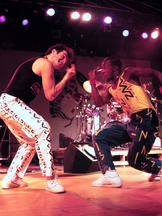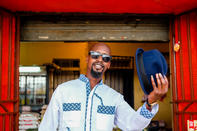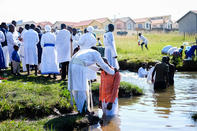Johnny Clegg

Musician Johnny Clegg (dubbed 'the white Zulu' by the European media) came onto the SA music scene in the 1960’s. As one particular story goes: Clegg's fluent Zulu made him an instant hit with the black workers and one Sunday evening they got together, egged on by his harmonious voice and township guitar rhythms.
On Monday morning the farmer was berating his hungover staff when the man standing next to Johnny, head hung low, urged under his breath, 'Woza Friday'. 'Woza Friday' became the first hit for Juluka (meaning 'sweat', in sympathy with the country's workers for whom their music was first intended).
When the musical duo of Johnny Clegg and Sipho Mnchunu that was Juluka disbanded in 1985, Clegg went on to form the internationally acclaimed Afro-rock band, Savuka ('we have risen'). Juluka cut its musical teeth among Soweto's hostel-dwelling migrant Zulu miners, playing a mixture of traditional choral and township kwela music.
As Johnny's and Sipho's talents blossomed, they moved into the public eye, playing at Jabulani Stadium and Fun Valley weekend resort; they soon became the darlings of Soweto. On the eve of Juluka's international breakthrough, Sipho decided that the time had come to return to his kraal in the green hills of Zululand.
Johnny was distressed, but his vision was as strong as his music. Using the backup musicians and tribal dancers from Juluka as a base, Johnny added a keyboard wizard and bass guitarist to the line-up and so rose Savuka, a new group using the powerful African rhythms that were Juluka's hallmark, replacing acoustic instruments with a bigger rock sound, and spicing it up with a new brand of political lyrics.
Where Paul Simon's 'Graceland' gives us a westernized version of local music, Savuka is the real thing. Recent tours in Europe and the United States with David Bowie, Steve Winwood, Joan Armatrading and the like have given the world a taste of a weekend in Soweto. Weekend in Soweto means party time.
The atmosphere is that of a carnival, more cosmopolitan than one would expect in South Africa; it is like a sprawling, single-storey Harlem, if you can imagine that. Tables are placed outside and old men sit around to chat, have a drink and pass the time. 'Ghetto blasters' blaring, there is music in the air and everyone seems to have a skip in their step.
Weekends in Soweto

On Saturday morning Soweto goes to town; it gets dressed up in its fashionable best and descends on downtown Johannesburg to shop. (Despite the boom in certain businesses in Soweto, you still cannot buy a suit there.) Johannesburg's Commissioner Street throngs with black bodies, jostling on the narrow sidewalks.
The Carlton Centre's underground shopping complex is a major attraction, while across the street the Kine Centre's movie emporium packs in the crowds, cinema apartheid being a thing of the past. Some major department stores that previously were the haunt of white housewives are beginning to realign their products to suit black consumers, especially those stores that specialize in clothing.
A Sowetan Wedding
For a man to be able to marry a woman, he has to pay the woman's father a lobola that was traditionally paid in cows, but nowadays is more likely to be money. A wedding in Soweto is really something to see; no expense is spared on the clothes or the catering.
The groom and best man will turn out in dramatic black and white dress suits and white gloves; the bride and her numerous bridesmaids will appear in white satin dresses, the bride complete with sparkling tiara, bouquet and train. An ox is slaughtered — and then begins the celebration.
It will probably last for two days, one day at the bride's family and the next at the groom's, and on each day the bridal couple will change their outfits at least twice. They will drive here and there in a hired convertible limousine, enjoying the attention. In Soweto, it is easy to confuse a funeral with a wedding, for after the burial all mourners are expected to return to the bereaved family's home to join in a feast. Sowetans like to give their dead a big send-off, so big, sometimes, that the wake will bankrupt the family.
An ox is ceremoniously slaughtered and the carcass is roasted and served with copious amounts of beer and pap, with desserts afterwards. In order to avoid financial ruin, families and neighbours enter into agreements, usually formally constituting a club, to contribute in the event of a death. Like a long drink of skokiaan, emotions at the funerals of political activists go straight to the head. These crowds are different from the usual funeral gatherings — they are angry as well as bereaved.
Comrades in mock military uniforms carry wooden rifles, they wave ANC flags, sing freedom songs and thrust clenched fists to the sky chanting 'Amandla!' ('Power'). At these funerals most of the mourners are teenagers, for the dead are usually their colleagues. They may have been shot by the police during protests, or have died as political detainees in police custody; occasionally it will be a man convicted for acts of terrorism and subsequently executed by the State.
At times people at these gatherings are pointed out as police spies and 'sellouts'. The chances are that such a person will be set upon by the mob and be 'necklaced', stabbed or stoned. The next funeral will be theirs. In the past, many of these funerals have been banned from taking place, or have been subjected to police intimidation.
When the crowd is worked up the situation is volatile; police presence and provocation can easily lead to a show of anger by the mourners. Quite fearlessly, they will advance on the police cars, throwing stones and, sometimes, petrol bombs. The only way the police know how to deal with these situations is with bullets. Further funerals may follow. For most white South Africans these events are seen as civil unrest, correctly controlled by the police; for many Sowetans, they are acts of aggression and even war.
It is a low-key civil war, waged by the police and State bureaucrats, and there seems to be no end in sight. But to others the police, and during the current State of Emergency the army as well, are a welcome pillar of law and order that counters the current brand of lawlessness and violence that has gripped township life.
Sunday is Church Day

Sunday is church day. The Catholic, Anglican and Methodist churches have their own faithful flocks, but the real religion of Soweto is encapsulated in the 900 or so Independent African Churches. Together they make up the black Zionist Christian Church, each group with its own uniform of colourful cassocks and icons, their crooks, their crosses and their Stars of David. It is not quite what the Pope ordained, or what the missionaries preached; it is a curiously unorthodox mixture of Old Testament Zionism and New Testament Evangelism.
The Sunday Zionist ceremonies seem to mix ecstatic Christianity freely with improvised African paganism. Hymns and 'hallelujahs' are sung rapturously with sweet warbling and booming baritone voices, and the highpoint of each ceremony is the baptisms. As the preacher chants devout prayers to the heavens, he often seems to forget that he is holding someone under the water.
Those being baptized hold their eyes tightly closed, faces set in grimaces, arms flailing, they splutter and gurgle as they are plunged repeatedly into the holy water. These spectacular baptisms were once (and sometimes are still) conducted in the streams that run through greater Soweto, but they are so polluted that a local swimming pool now masquerades as the River Jordan.
By David Bristow